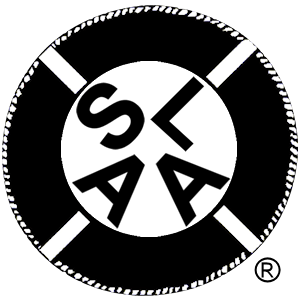The Question:
The meetings in my area and also our Intergroup have ongoing dealings with the other S-Fellowships in our area. A member of one of the other fellowships compiles and maintains a list of meetings for all the S-programs in the area. There are summer and winter retreats co-sponsored by several of the S-Fellowships.
There has also been discussion of having an S.L.A.A. representative attend the intergroup meetings of at least two of the other fellowships, and having representatives from those fellowships attend our intergroup meeting.
Recently, a meeting has decided to adopt a mixed format, using S.L.A.A. literature and that of another Fellowship on alternating weeks. They are one meeting, not separate meetings occurring on alternating weeks. There is only one collection of the 7th Tradition, and the meeting holds itself out as an S.L.A.A./other fellowship meeting.
At what point do these arrangements violate Tradition 6.
(Editor’s note: The names of other fellowships and the city have been edited out for sake of anonymity.
I would like to form an exploratory committee to research the feasibility of combining all of the S-groups into one big group…literature from all groups would be combined into one huge library. Metropolitan areas would only need one Intergroup. They would only need one contact phone number. Seventh Tradition from all these groups combined would enable the single, combined World Office to provide literature at reduced costs.
Of the Inter-fellowship issues with which the Intergroup is dealing, the most controversial in my mind is the joint meeting. The group is literally lending the S.L.A.A. name to a meeting which is equally a meeting of another fellowship. The Seventh Tradition funds are split after costs, and assuming the meeting draws equally from those who primarily identify themselves as S.L.A.A. and members of another fellowship, money ought not to be the primary concern. “Prestige” in the sense of pride would not seem to be a concern either. It is simply another meeting of people who qualify for our program (and coincidentally, another as well). But “prestige” in another sense could e an issue; public reputation. By affiliating publically with a different Twelve-Step program with different trusted servants, operating under different group conscience, the reputation of S.L.A.A. is subject to being directly affected by the actions of another group, one with which the Fellowship as a whole has not developed a group conscience to be associated. Nothing is more core to our function as a recovery program than the meeting of a group of addicts, helping each other to recover through the Steps and Traditions. It is not clear to me that at this stage, the choice of one meeting in one city to deal with one addiction by using literature from two Fellowships which have adopted the same A.A. model of recovery constitutes a matter affecting other groups or S.L.A.A. as a whole, or presents a “problem of money, property or prestige.” It may be a precedent that warrants further consideration at a later date, but cannot be said at present to be clearly in violation of Traditions 4 or 6.
I realize that in certain areas of the country, where there are few meetings of any of the S-Fellowships, that there are Service Groups consisting of members of several S-Programs as well as Co-S Programs, where they combine their resources in order to have a web presence and where they come together for retreats and other sharing days. This seems to work well for them; however, there seems to be blurring of the differences between the various S-Fellowships. They each meet separately, but since a great number of members from each Fellowship attend meetings with other fellowships, there is the tendency to adopt some varying viewpoints regarding recovery and defining sobriety and what should be done.
I do see a violation of Tradition 3, “…any two or more persons gathering together for mutual aid in recovering from sex and love addictions may call themselves an S.L.A.A. group, provided that as a group they have no other affiliation.” This statement from Tradition 3 tells me that we may not be yoked together with other groups or organizations (religious or secular) as we come together for recovery. Such an affiliation seems to appear to be an endorsement of the other fellowship or organization. This could lead to having a mega-group which could become so large so as to violate Tradition 6, “…lest problems of money, property or prestige divert us from our primary purpose.” Until the Inter-fellowship Committees of all fellowships come together and would come to some kind of unity statement and all the Conferences or Service Organizations approved the unity, I believe that we are all better served by staying independent and carrying on as we have for the past 30 years.
I see no reason to limit the recovery of members who live in smaller communities if they want to sell and study the literature of more than one S-Fellowship in the same weekly meeting. Why rent two meeting sites on different days for one small group of people and sell literature from only one fellowship at one meeting and the other fellowship at the other meeting? Seems to me that selling literature from both fellowships, and even more than two fellowships at the same meeting, is an efficient and appropriate way to carry the message to the addicts who still suffer. With autonomy, flexibility and support, rather than interference, reaching out to the sex addicts who still suffer can be increased.
Today, it really seems that we have much to learn from each other and cooperation is quite different than “merging”. I would enthusiastically support having joint conferences with meetings led by members of all fellowships. That cooperation would not violate the Traditions in any way, in my opinion.
It does bother me that there is a meeting that calls itself S.L.A.A. and another organization at the same meeting. The Tradition that any group can call itself an S.L.A.A. group as long as it has NO OTHER affiliation in addition to S.L.A.A. keeps coming to mind. Every group is autonomous and can use whatever literature it wants.
A Group can send FWS any contribution it wants as long as it is less than the annual maximum contribution. We can define our own bottom lines. Differences of opinion are irrelevant. But being aligned with 2 groups simultaneously is not consistent with my understanding of the S.L.A.A. Traditions.



